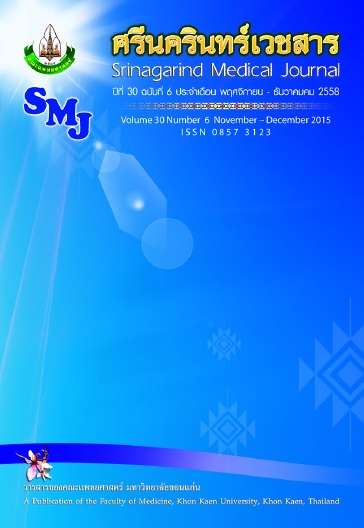Thrombomodulin gene -33GA Polymorphism in Thai Patients with Coronary Artery Disease
Abstract
Background and Objective : Thrombomodulin (TM) is an endothelial cell-expressed glycoprotein which is an essential cofactor that impacts on a process of haemostatic balance, negative mitogenic effect on proliferating cell and anti-inflammation. A decreased expression of TM on the endothelial cell surface and an increase in its soluble forms in plasma may therefore contribute to atherosclerosis leading to coronary artery disease (CAD). Meta-analysis on the association between thrombomodulin gene polymorphism and CAD has revealed the association of TM -33GA polymorphism in Asian populations. However, this relationship has not been done in Thai patients. This study therefore aimed to investigate the relationship between TM -33 GA polymorphism and CAD as well as CAD risk factors and severity of the disease.
Methods : A total of 327 case-control study was carried out in subjects who were clinically suspected of having CAD and were undergoing coronary angiography at Queen Sirikit Heart Center of the Northeast Hospital, Khon Kaen University. Based on angiographic results, 197 subjects were classified as CAD and 130 subjects with normal coronary artery or less than 50% stenosis were control group. The number of stenosis vessels and Gensini scoring system were used to evaluate coronary artery stenosis severity. TM -33GA gene polymorphism was determined using polymerase chain reaction-restriction fragment length polymorphism (PCR-RFLP) technique.
Results : The frequency of TM -33 GA+GA genotype between CAD and control group (8.1 vs 8.5%) was not significantly different (p=0.885). Moreover, the significant differences of the genotype distribution were not found when compared between the subjects with and without CAD risk factors including hypertension, dyslipidemia, diabetes mellitus, obesity and smoking. In addition, significant differences when compared between the patients with different number of disease vessel and Gensini score were not found.
Conclusions : The results of this study may suggest that there is no association between TM -33 GA polymorphism with CAD, CAD risk factors and the severity of the disease in Thai.




